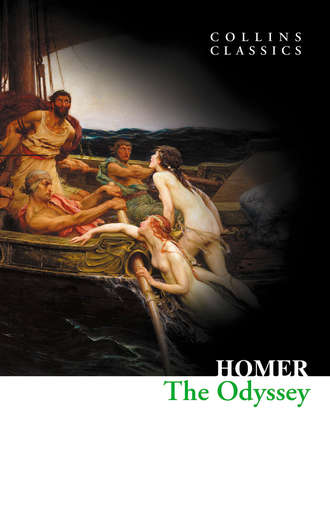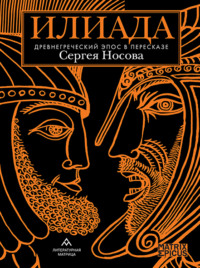
Полная версия
The Odyssey
Eurymachus son of Polybus then put in his word. ‘Telemachus, the question of which Greek shall reign over this island lies on the lap of the Gods. Yet assuredly you shall possess your belongings and have the lordship in your own houses: nor against your will shall any man come and strip you of them forcibly while Ithaca holds an inhabitant. But my good lad, let me question you about that visitor of yours who slipped away so suddenly that none of us had time to make him out. Yet his face was not the face of a negligible man. Whence came he and what country gave he as his own? Where do his kindred live and where are the corn-lands of his family? Did he come with news of your father, or on some business of his own?’
Discreetly Telemachus reassured him: ‘Eurymachus, the time of my father’s return is long over. I do not now credit any messages regarding him, whatever their source. Nor does any soothsaying take me in: though my mother may at whiles call some noted diviner to the palace and seek sooth of him. As for the stranger, he is a former friend of our family from Taphos called Mentes, whose father was old wise-minded Anchialus. Mentes is a man of authority among the seafaring Taphians.’ So he said: but secretly Telemachus was sure of the immortal Goddess. Howbeit the suitors turned to dance and to the enthralling song, making merry while the evening drew down; and they celebrated until evening had darkened into night. Then the longing for sleep took them and they scattered, each man to the house where he lodged.
The mind of Telemachus was perplexedly brooding over many things as he also sought his bed within his own room, which was contrived in the highest part of the main building, that stately landmark of the country-side. Eurycleia the daughter of Ops son of Peisenor, attended him, lighting his way with flaring slips of pine-wood – Eurycleia the trusted, the adept, who, in the flush of her youth, had been bought by Laertes, out of his great wealth, for the price of twenty oxen. In the house Laertes had esteemed her even as his beloved wife, but never dared have intercourse with her, fearing the temper of his wife. Of all the servants it was Eurycleia who most loved Telemachus, for she had nursed him when he was a tiny child. Accordingly it was she who lighted him to his well-built room.
He flung open its doors and sat himself on the couch. There he pulled off his long clinging tunic, which the old woman received into her skillful hands and folded and patted into smoothness before she hung it on the clothes-peg beside his fretted, inlaid bedstead. Then she quitted the chamber, pulling-to the door after her by the silver beak which served as handle and sliding the bolt across by its leathern thong. And there Telemachus lay all night, wrapped in a choice fleece, pondering in his heart how he should compass the journey enjoined upon him by Athene.
BOOK 2
So soon as rosy-fingered morning came forth from the first grey dawn, the beloved son of Odysseus sprang from bed, dressed, threw the sling of his cutting sword over one shoulder, and tied the rich sandals round his nimble feet: stately as a God he stepped out and down from his bed-chamber. On the moment he had called his heralds and told them to sound, with their ringing voices, the assembly amongst the long-haired Achaeans. As he bade, the heralds sounded: and as they bade, the Achaeans assembled speedily. Telemachus waited till all had come together into place and then, tightly gripping his copper-bladed spear, he strode through their throng. For company he had just his two flashing-footed dogs at heel: but Athene poured about his form so significant a glory that upon his approach the eyes of the crowd were held at gaze. The elders yielded him way and in his father’s great chair he sat him down.
Debate was opened by honoured Aegyptius, an aged councillor of ten thousand wiles, whose years bowed him double. He was quick to speak because his favourite son, Antiphos, expert with the spear, had gone away with Odysseus in the capacious ships to Ilios, that land of good horses. To tell truth, Antiphos was even now dead, barbarously slain in the vaulted cave by the Cyclops, who had cooked him, too, and eaten him for his latest, and his last, feast. Aegyptius had yet three other sons. One of them, Eurynomus, had thrown in his lot with the suitors; and two kept the house, helping with the husbandry: but the consolation of these did not still the old man’s inward aching and outward lamentation for the one who had not returned. Therefore it was that he now rose up and spoke through his tears: –
‘Hear now, O men of Ithaca, and attend my words. Never once since the day that mighty Odysseus sailed from us in his ribbed ships, has our assembly met in session. Who is now our convenor? Is some one of the new generation in extreme urgency? Or one of us elders? Perhaps an army approaches, of which a man has had warning and would make us share his certain knowledge? Or is it some matter touching the common weal, which he would disclose and expound? Anyway I judge his zeal timely: may the event turn to his advantage, and Zeus ensure him the good thing for which his soul yearns.’ – Thus far: and the dear son of Odysseus rejoiced at the auspicious phrase. The longing to deliver his mind pricked him to his feet in the midst of the gathering. Peisenor the herald, past master by experience of public conduct, thrust into his hands the gavel which gave right to speak: and Telemachus began, addressing himself first to the old councillor.
‘Venerable Sir, the man who convened the people is not far to seek. Here he stands, in your eye. I am compelled to action by the burden of my pains. I have no word of any army coming, no advance or exclusive news affecting that or the common estate. The need, the motive, is personal. A two-headed evil has stricken me and struck my house. I have lost my noble father who was once your king, the king of all present: but also my very gentle father. And upon this harm comes far heavier harm, one which bodes the early wasting of my home and an utter ruin of my livelihood.
‘My reluctant mother is plagued by suitors, sons of the leading men in this and other islands. Their honest course would be to interview her father, Icarius, and ask him to fix his daughter’s marriage terms and give her to the man he liked or found fittest from among them. But they shrink in a twitter from such plain dealing. Instead they have fallen to haunting our place day after day, at the expense of my sleek cattle. Oxen and sheep and goats must be sacrificed to feast their greed. They gulp our wine – stuff with the glint of sunlight in it – like ordinary drink. Everything is being spent.
‘Odysseus, now, was a man who could defend his house against the spoiler: but there is nothing of his build about us. So long as we live we shall remain feebly untrained bodies, incapable of such defence. Not for want of willing: it is strength I lack, to meet this intolerable provocation; the grim, slow sack of my innocent house. Will not a fellow-feeling for people who are living beside you, neighbours, make you share their vexation and ashamedly pity their plight? Pray you, Sirs, begin to fear the anger of the Gods a little, lest they be aghast at the evil already wrought and turn to requite it. I beseech you by Olympian Zeus, and by Themis, in whose justice courts like this are gathered together and, after session, released. No. Rather, my friends, let me be. Leave me to wear myself out with the misery of my own grief. Perhaps Odysseus, the father who was so good to me, in reality hated his panoplied Greeks and did them deliberate injuries; which you now in turn deliberately repay by cheering on my afflictors. Better hap for me, by far, if yours were the appetites emptying my store-houses and byres. For then how soon there would be a counter-stroke! We should go through the city with our tale, clinging as suppliants to all we met, demanding our monies, till everything had been given back. But as it is, you heap up in my heart these irremediable pains.’
So he spoke through his gathering rage: and here, in a gust of tears, he flung the gavel to the ground. The audience were seized with pity and sat still and silent, all of them, lacking face to return angry words to these words of Telemachus. Finally Antinous gave tongue as follows: –
‘Your lost temper and haughty lips, Telemachus, conspire to smirch our conduct and link us with disgrace. Yet I tell you it is not the suitors who are guilty, among the Achaeans, but your respected mother, that far-fetched artful mistress. For these three years – nay, longer: in the fourth year now – she has rapt away the wits of the Achaean men. She has led every one of us to hope, given each his privy assurance, let fall little messages: while her heart all this while has been harbouring quite other designs. One trick her subtlety devised was to instal in her apartments a huge loom, and set up on this a fine wide weave; and ever she would say to us, “Sweet hearts, go slow. Allay your burning intent to have me married. The death of royal Odysseus lays on me the duty of completing this linen shroud, to save its gossamer threads from being scattered to the winds. It is for the burial of Laertes, the aged hero: and it must be ready against the inevitable day when fate will pull him to the ground and death measure out his length. If I leave it undone, and in consequence the corpse of this old, once-wealthy man lie bare of cerement, I shall be the pointing-block of every Achaean woman within our neighbourhood.”
‘So she protested, and our manly hearts credited her tale. Daily she laboured at the vast loom, weaving: but each night she had torches brought in and unravelled the day’s woof. Thus for the space of three years she deceived us and cheated the Achaeans: but when the fourth year was wearing through its sequence of seasons one of her maids, who knew the whole truth, told on her. Then we caught her in the act of unpicking the glorious web: and forced her against her inclination to finish it right off. Hear, therefore, Telemachus, the suitors’ reply to you: hear and understand it to the bottom of your heart, and all the people of this country with you. Send away your mother. Order her to be wedded straightway, as her father will command, to the man who best pleases her.
‘But if, instead, she insists on continuing to wreak havoc among the bachelors of Achaea, then let her do so – at the price. Athene has bestowed on her an armoury of graces (skill in all the housewifely crafts, and such arts and airs as her guileful wit adeptly turns to personal advantage) beyond parallel among the famous beauties of old time: not Alcmene, nor Tyro, nor diademed Mycene could match this Penelope in intriguing charm. Yet, for the time, you shall see that her intrigues are not opportune. The suitors will swallow up your goods and sustenance for just so long as she persists in this frowardness which heaven has let possess her mind. She gains her notoriety: you regret your substance, vainly lost. We shall not go about our business nor go home till she has made her choice and been married to some one of us Achaeans.’
With measured words Telemachus answered him. ‘Antinous, in no way can I forcibly expel from our house the mother who bore me and gave me nourishment. Besides, there is my father somewhere in the earth – if he lives – or perhaps he is dead. At any rate, consider the terrible expense if mine were the hand which put her away: I should have to pay back her dowry to Icarius. And to what end? I should be evilly entreated by her father. More evil would fall on me from above, for as she was driven from our door my mother would imprecate against me the dread furies. Also my fellow-men would condemn me out of their mouths. So I shall never stoop to give her such order.
‘But listen – you and the other suitors. Do our family affairs jar your sense of niceness? Then get out of my guest-quarters. Arrange to entertain each other from your own resources, turn and turn about among your houses. Yet, if you find it pleasanter and better to go on scathelessly destroying the entire livelihood of a lone man – then go on. Meanwhile I shall be praying to the everlasting Gods, if perchance Zeus may grant that due penalties be paid. For then will our house, unscathed, see all of you destroyed within its walls.’
So did Telemachus invoke Zeus: and the All-seeing, in answer to his prayer, sent forth two eagles from his mountain top. Swift as the storm-blast they flew, wing-tip to wing in lordly sweep of pinions, until they were over the midmost of the many-tongued assembly. There they wheeled in full flight, with quivering, outstretched, strong wings, and glazed down with fatal eyes upon the upturned faces. Next they ripped with tearing claws, each at the other’s head and neck, swooping quickly to the right over the houses of the citizens. So long as eye could follow them everyone stood wondering at the birds and musing what future history this sign from heaven could mean.
While they mused came the voice of Halitherses, son of Mastor, an elder of great standing who surpassed all his generation in science of bird-reading and the foretelling of dooms. Out of this deep of knowledge he now held forth: ‘Hear me, islanders of Ithaca: hear me out. Especially the suitors, for what I portend concerns them most. Great evils are rolling down upon them. Odysseus will not longer remain sundered from his people. Even now, it may be, he approaches, carrying within him the seeds of bloody doom for every suitor. He will be deadly, too, for many others of us substantial men in this island of the pellucid skies. Wherefore before the event let us devise a plan by which the offence of the suitors shall be removed – unless they forthwith remove their own offence, which, did they study their interests, would be their wiser choice.
‘I speak of what I know surely. This is not my first essay in divination. Everything has come to pass of what I prophesied to Odysseus, when that resourceful leader was sailing for Ilios with the Argive host. I foretold that after enduring many disasters and the loss by death of his whole fellowship, he would at the last find himself again made free of a home, where no one knew his face, in the twentieth year from his setting out: and today all this mounts to its fulfilment.’
Him, in turn, Eurymachus son of Polybus denied. ‘Come, come, dotard. You will do better to stay at home and prophesy to your children, saving them from this wrath to come. In practical affairs I am the master-prophet. Multitudes of birds flit hither and thither in our bright sunshine: but not all bear messages from heaven. Odysseus, of whom you prate, died long ago and far enough away. If only you had gone and died with him! Then we should have escaped these oracles of yours, and you would not have had this chance of perhaps making future capital for your family by egging on the vexed Telemachus to publish his griefs.
‘Yet, I fear, your family will never receive from him the reward you envisage. I am about to speak hardly: but what I say shall surely be. When an elder of long and wide worldly experience prostitutes his stored wisdom to abet a young man’s anger; then, in first instance, the consequences are very grievous for the young man, who finds himself impotent to bend his hearers to his will. And secondly, for you too, Ancient, the regrets will be bitter. Upon you we shall lay such fine as will make your heart ache to pay it.
‘Now, before you all, I have advice for Telemachus. He must order this mother of his back to her parents, for them to decide her re-marriage and assess the sumptuous interchange of gifts which go with a dear daughter. I assure you that till then the cadets of the Achaeans will not desist from their irksome and exigent wooing. Why should they? We fear no one on earth: certainly not Telemachus with his bluster. Nor are we to be moved by the soothsayings which you, old man, mouth over at us, without end – save to make yourself ever more generally detested. Telemachus’ goods shall be ruthlessly devoured, and no fair deal come his way while Penelope thwarts the people in this matter of her re-marriage and keeps us dancing attendance on her, day in, day out; our passions too excited by the chance of winning so admirable a bride to cultivate any of the ordinary women who would make us fitting mates.’
‘Eurymachus,’ said Telemachus in deliberate reply, ‘I will not re-open entreaties or discussion upon this subject, with you or any other arrogant suitor. We have deferred our case, in fullest detail, to the Gods: and made it known to all the Achaeans. Instead, I now ask you for a clean-built ship and twenty rowers to man her. In this I purpose to go round Sparta and sandy Pylos, enquiring after my long-lost father. Perhaps news of his return is to be gleaned from men: or a whisper may come to me from Zeus, whose breath oftenest conveys forewarnings of truth to us mortals.
‘If I learn that my father is alive and on his homeward way I can endure this wilful spoiling of my house for yet a space: but if it be confirmed that he is dead and gone, then I will turn back to this loved land of mine and heap up for him a barrow to hold the rich tomb-furniture which is seemly for so grand a name. Afterward I will give my mother to a man.’
He ended and sat down: and there rose from the throng Mentor, the comrade to whom stout Odysseus, on sailing for Ilios, had committed his house; enjoining all in it to be obedient to the old man and in his steadfast guard. Wherefore out of his good heart Mentor protested as follows: ‘Give heed, now, men of Ithaca to what I say to you. Here is a warning to all sceptered kings, that they wholly abjure clemency and gentleness, and take no thought for just dealing. Instead let them be harsh always, and unseemly in conduct: for glorious Odysseus, your king and the king of all this people, was like our father in his mildness – and lo! not one of you remembers him. Yet I advance no plaint against these haughty suitors, whose ill-nature has led them into deeds of such violence. Indeed this violence I find not excessive, weighed against their risk. They have staked their heads upon a persuasion that he comes home no more. My complaint is rather against the rest of the people, because you have sat by mutely, without word of denunciation or restraint: though you are very many, and the suitors are but few.’
Leocritus, the son of Euenor, opposed him. ‘Mentor, you crazy mischief-maker, why waste breath in pleading that the people stop our nuisance? To make war over a matter of feasting would be outrageous, superior numbers or no superior numbers. Even suppose that your Odysseus of Ithaca did arrive in person, all hot to drive from his palace the noble suitors who have made it their banqueting hall. His wife may yearn for his coming: but in that way she would have small joy of it. In his very palace he would encounter horrid fate if he alone attacked so many of us. You babble vainly. Enough of this. Let all the people return to their employments, leaving only Mentor and Halitherses (because they have long been hangers-on of his family) to deal with this youth’s journeying. Yet I fancy he will stay long enough in Ithaca, news-gathering still from his chair: and the project of a voyage come to nought.’
He finished, and the assembly was speedily dissolved, the crowd streaming homeward: while the suitors repaired to the palace of magnificent Odysseus. But Telemachus walked by himself far along the margin of the sea, and there laved his hands in the transparent sea-water before praying to Athene. ‘Divine One, hear me! Yesterday you came to my house and told me to venture by ship across the shadow-haunted main, seeking news of my absent father. Now see how the Achaeans, and especially these lustful, bullying suitors, thwart my every turn.’
While he prayed Athene drew nigh. She had put on the appearance of Mentor’s body, to the life: and it was with Mentor’s voice that she exhorted him stirringly, thus: – ‘Telemachus, let not your courage and resource fail you now. In your father deed and word notably marched together to their deliberate end. If your body holds a trace of his temper it will suffice to make this effort of yours neither bootless nor aimless. But if, on the contrary, you are not true issue of Odysseus and Penelope then I may abandon hope of your achieving any purpose. Few are the sons who attain their fathers’ stature: and very few surpass them. Most fall short in merit. But surely this time you will not, you cannot, prove fainthearted or base: nor can you have failed to inherit some of Odysseus’ cunning. Therefore I have good hope that you will attain your goal. Pay no heed to the advice or intentions of these infatuate suitors. With them instinct and decency are alike at fault; nor do they apprehend the death and black fate hovering over them, to overwhelm them all in a day.
‘As for this journey of your heart, it shall not be too long denied you. Because I was a friend of your father’s, therefore I am myself obtaining you the fast ship: and I shall be of your company aboard her. For the moment do you go back to your house, and mingle cheerfully with the suitors: while you get ready the victuals. Pack everything securely. Let the wine be in wine-jars and the barley meal (the marrow of men’s strength) in tough skins. I will very quickly gather from the town our crew of willing fellows. Sea-girdled Ithaca is rich in ships, new and old. I go to survey them and choose the fittest; which we will presently equip and launch into the open sea.’
So said Athene, the daughter of Zeus. Telemachus, hearing the divine accent, made no delay but returned straight home with his heart-ache, to find the suitor-lords in guest-hall or fore court, where they were stripping the skins off his slaughtered goats and singeing his fat pigs for the cooking fire.
Antinous, with a laugh and loudly calling his name, swaggered up to him and took his hand. ‘Telemachus,’ said he, ‘you have just now given your enmity too free tongue against us. Instead, will you not henceforward banish from your mind these thoughts of doing us hurt and forget your injurious words and eat and drink with us as of yore? Meanwhile the Achaeans will be making quite ready for you all you want in the way of ship and crew, to take you most quickly to hallowed Pylos for news of your august father.’
Well-advised was the reply of Telemachus, as he gently drew his hand from the grasp of Antinous. ‘It is not possible for me to dine softly in your too-proud company: to be at ease and merry-make. O suitors, was it not grief enough that in my callow childhood you shore from me so much of my precious goods? Today I am a grown man and hear from others all this tale; and verily my swelling heart prompts me to visit upon you every evil I can contrive, whether from Pylos or in this place. Therefore will I most surely go on my journey: nor shall it be a barren quest, though by your crafty precaution I travel but as a passenger, without ship or rowers of my own.’
The suitors went on feasting their hardest, where they were, till he had spoken. Then they hooted and jeered at him. One graceless cockerell held forth after this strain: ‘Really, Telemachus does mean to kill us all. He now hates us so terribly that he may bring back avengers with him from the sands of Pylos or from far-away Sparta. Or perhaps he plans to visit the luxuriant fields of Ephyra, and procure some life-destroying drug to mix into our wine-bowl and cut us all off together!’
And another youth of the same sort cried out, ‘I tell you what, if he goes off in the inside of a ship, perhaps he will wander away from his friends, like Odysseus, and get lost. Then what extra work we poor creatures will have, dividing up all his belongings among ourselves. I vote we give the house-property to his mother, for the man who makes her his wife.’
Thus they japed: but Telemachus went from them to his father’s store-chamber. Under its high, wide dome lay heaped up the gold and the copper: also great chests of clothing, and an abundance of pleasant-smelling olive oil. Secured against the wall in ranks, stood jar upon jar of old delicious wine, every jar filled with pure liquor, fit for the Gods but awaiting the day of Odysseus’ home-coming – if he was ever to come home, through his toils and pains. This treasure-room had swinging double doors, strong and tight, always shut: and between them, day and night alike, there lodged the woman-guardian, old Eurycleia, the daughter of Ops, Peisenor’s son. She in her sagacity stood watch over all its wealth.









